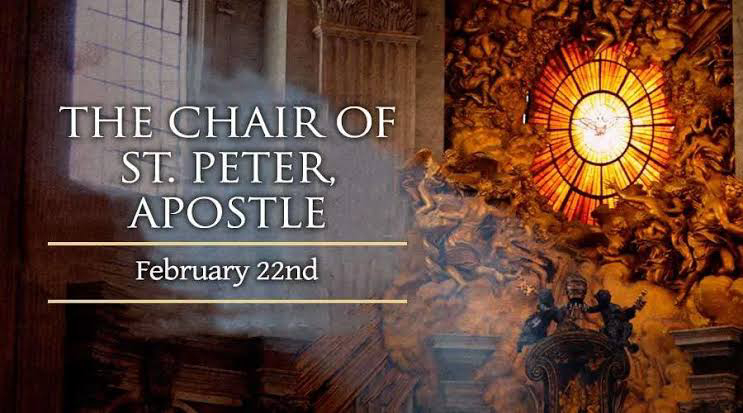Thursday, February 27, 2025
DIVINE WHISPER with Fr. PiusRalph EFFIONG, SMMM
Wednesday, February 26, 2025
DIVINE WHISPER with Fr. PiusRalph EFFIONG, SMMM
Tuesday, February 25, 2025
DIVINE DIVINE WHISPER with Fr. PiusRalph EFFIONG, SMMM
Monday, February 24, 2025
DIVINE WHISPER with Fr. PiusRalph EFFIONG, SMMM
Sunday, February 23, 2025
DIVINE WHISPER with Fr. PiusRalph EFFIONG, SMMM 0
Friday, February 21, 2025
DIVINE WHISPER with Fr. PiusRalph EFFIONG, SMMM
Beloved in Christ, good morning to you all with God's choicest blessing. Today, as we are celebrating the solemn feast of the Chair of St. Peter I wish to bring to you a commenatry on this ancient Chair of charity, love and service.
Reflecting on St. Peter's leadership and authority, highlights the importance of serving with love, compassion, and humility. He symbolizes rock of faith (cf. Matthew 16:16). This role serves as the foundation of the Church, encouraging steadfastness and loyalty. This chair also depicts shepherd's care which focused on St. Peter's role as a shepherd of God's flock (cf. John 21:15-17), emphasizing the importance of pastoral care and guidance.
The Feast of the Chair of St. Peter is a celebration of the authority given by Christ to St. Peter as the leader of His Church. The "chair" symbolizes not just a physical seat, but the authority and responsibility of leadership within the Christian community. This feast serves as a reminder of the unique role Peter played as the rock upon which Christ built His Church and the succession of that authority through the papacy.
In reflecting on this feast, we might consider the nature of true leadership in the Church. Peter was not perfect, yet Jesus entrusted him with great responsibility. His human failings—his denial of Christ, his impulsiveness—highlight that leadership in the Church is not about perfection, but about humility, repentance, and fidelity to the mission of Christ. The Chair of St. Peter, then, calls us to reflect on the call to serve others, to guide with love, and to remain steadfast in our faith, despite the challenges and imperfections we may face.
We are also reminded of the unity that the papacy symbolizes for the Church. In a world often divided, the papacy serves as a sign of the unity of Christ's followers, bringing them together under the guidance of the Holy Spirit. As we honor the Chair of St. Peter, let us pray for the Pope, that he may continue to lead the Church with wisdom, courage, and compassion, and for all those who are called to leadership in the Church to be faithful and humble in their service.
DIVINE WHISPER with Fr. PiusRalph EFFIONG, SMMM
(1007-1072). Peter Damian, a Benedictine monk, was the author of many important works of liturgy, theology and morals. He supported St. Gregory VII in his struggle for the rights of the Church.
Thursday, February 20, 2025
DIVINE WHISPER with Fr. PiusRalph EFFIONG, SMMM
Today's themes for reflection are essential aspects of the Christian life, reflecting God's desire to redeem, restore, and make whole His children. Recalling the words of the psalmist who said: "He restores my soul; He leads me in the paths of righteousness For His name’s sake." (Psalm 23:3). And Prophet Isaiah in the third Book of Isaiah proclaimed: "The Spirit of the Lord God is upon Me, Because the Lord has anointed Me To preach good tidings to the poor; He has sent Me to heal the brokenhearted, To proclaim liberty to the captives, And the opening of the prison to those who are bound." (Isaiah 61:1-3). It is in the same spirit that St. Peter having seen the need for Divine restoration and healing prays that the God of all grace who called us to His eternal glory may perfect, establish and settle us to wholeness (cf. 1 Peter 5:10).
Consequent upon this, today's readings pay great allusion to these themes, emphasizing the concern of God to restore us despite our shortcomings and inadequacies. In the first reading, after God must have regretted creating man, but out of love for mankind He saved the human race through Noah whom He was delighted with (cf. Genesis 8:6-13.20-22).
On the other hand, the gospel pericope singled out the theme of restoration as its major concern as Christ restored the blind man to wholeness by regaining his sight (cf. Mark 8:22-26).
However, on our own part the concept of restoration and healing within the context of our living experience has diverse forms or aspects ranging from spiritual restoration which has to do with our reconciliation with our God by acknowledging our failings. Another aspect is a relational restoration which involves restoring broken relationship with one another and healing of wounded minds; and emotional healing - that is seeking for peace of mind, comfort and liberation from emotional trauma.
Above all, the virtue of forgiveness is the bedrock of all restoration and healing. As Christ Himself exhorted His disciples in the Lord's prayer when he said: "... forgive us our trespasses as we forgive those who trespasses against us." By implication our failure to forgive one another is a barrier to receive forgiveness from God which leads to our healing and restoration.
In conclusion, these two readings exhorted to a life of trusting God's transformative work, restoration and healing of our infirmities. In reciprocation to this kind gesture and undeserved favour we need to forgive one another, mend broken tryst and make up every doubt about us. It is in doing this that we will certainly be healed abd restored, for God says: "I will RESTORE health to you, and I will HEAL your wounds" (Jeremiah 30:7).
Tuesday, February 18, 2025
DIVINE WHISPER with Fr. PiusRalph EFFIONG, SMMM
Today's themes for reflection are essential aspects of the Christian life, reflecting God's desire to redeem, restore, and make whole His children. Recalling the words of the psalmist who said: "He restores my soul; He leads me in the paths of righteousness For His name’s sake." (Psalm 23:3). And Prophet Isaiah in the third Book of Isaiah proclaimed: "The Spirit of the Lord God is upon Me, Because the Lord has anointed Me To preach good tidings to the poor; He has sent Me to heal the brokenhearted, To proclaim liberty to the captives, And the opening of the prison to those who are bound." (Isaiah 61:1-3). It is in the same spirit that St. Peter having seen the need for Divine restoration and healing prays that the God of all grace who called us to His eternal glory may perfect, establish and settle us to wholeness (cf. 1 Peter 5:10).
Consequent upon this, today's readings pay great allusion to these themes, emphasizing the concern of God to restore us despite our shortcomings and inadequacies. In the first reading, after God must have regretted creating man, but out of love for mankind He saved the human race through Noah whom He was delighted with (cf. Genesis 8:6-13.20-22).
On the other hand, the gospel pericope singled out the theme of restoration as its major concern as Christ restored the blind man to wholeness by regaining his sight (cf. Mark 8:22-26).
However, on our own part the concept of restoration and healing within the context of our living experience has diverse forms or aspects ranging from spiritual restoration which has to do with our reconciliation with our God by acknowledging our failings. Another aspect is a relational restoration which involves restoring broken relationship with one another and healing of wounded minds; and emotional healing - that is seeking for peace of mind, comfort and liberation from emotional trauma.
Above all, the virtue of forgiveness is the bedrock of all restoration and healing. As Christ Himself exhorted His disciples in the Lord's prayer when he said: "... forgive us our trespasses as we forgive those who trespasses against us." By implication our failure to forgive one another is a barrier to receive forgiveness from God which leads to our healing and restoration.
In conclusion, these two readings exhorted to a life of trusting God's transformative work, restoration and healing of our infirmities. In reciprocation to this kind gesture and undeserved favour we need to forgive one another, mend broken tryst and make up every doubt about us. It is in doing this that we will certainly be healed abd restored, for God says: "I will RESTORE health to you, and I will HEAL your wounds" (Jeremiah 30:7).
Monday, February 17, 2025
DIVINE WHISPER with Fr. PiusRalph EFFIONG, SMMM
The human condition is marked by sin, corruption, and moral decay. We are prone to making mistakes, hurting others, and succumbing to our feelings. Though life itself is characterized by suffering, pain and hardship. This aspect of human state is the product of man's insatiability and cravings which led to God's anger as the Scripture says:
"After the Fall, God tells Adam that the ground will be cursed, and he will have to work hard to earn his bread. This passage implies that suffering and hardship are a consequence of humanity's disobedience." (Genesis 3:16-19). Job on the other hand avers: "Man is born to trouble as surely as sparks fly upward." (Job 5:7) This verse, spoken by Eliphaz, suggests that suffering is an inherent part of the human experience. And the Psalmist summarised the state of man thus: "Our days may come to seventy years, or eighty, if our strength endures; yet the best of them are but trouble and sorrow, for they quickly pass, and we fly away." (Psalm 90:10) Here the psalmist acknowledges that life is short and often filled with trouble and sorrow.
However, situating this within the context of today's reflection the "gory state of human condition" might refer to the consequences of humanity's rebellion against God, in the first reading (cf. Genesis 3:1ff.; Genesis 6:5-8; 7:1-5.10), the situation that prompted God to regret ever creating man. This text emphasizes the depth of human sin and the brokenness of creation. God’s judgment is not arbitrary, but comes in response to the pervasiveness of evil. Amidst this, He still shows humanity mercy through Noah who found favour before Him (Genesis 6:8).
Sunday, February 16, 2025
DIVINE WHISPER with Fr. PiusRalph EFFIONG, SMMM
Seven members of a Florentine confraternity founded the Order of Servites of the Blessed Virgin Mary. The Servites lead an austere life of prayer and mortification, meditating constantly on the Passion of the Lord and venerating the Blessed Virgin as Our Lady of Sorrows.
In conclusion, just like the Seven members of a Florentine confraternity whom we celebrate today who stood firm in faith and trust in God in their life time, we are challenged to trust in God without needing constant signs or confirmations, to believe in His presence in our lives, and to let go of doubts that can keep us from experiencing His grace. For indeed He is the Way, the Truth and the Life.
Thursday, February 13, 2025
DIVINE WHISPER with Fr. PiusRalph EFFIONG, SMMM
(+869) (+885). These two brothers evangelized , , and . Methodius was consecrated bishop by Adrian II. John Paul II proclaimed them patron saints of Europe, along with St. Benedict, abbot.
The term "Ephphatha" is an Aramaic word that means "Be opened." It appears only once in the Scripture when Jesus heals a man who is both deaf and has a speech impediment (cf. Mark 7:34) which is an extract of today's pericope were we got the theme of our reflection from.
In this passage, Jesus uses the word to heal a man who is deaf and has a speech impediment. When He says "Ephphatha," He is commanding the man's ears to be opened and his ability to speak restored.
This word is significant because it highlights the miraculous nature of Jesus' healing. It is also sometimes used symbolically to represent spiritual openness or awakening, calling people to hear and respond to God's message.
However, the term used is not just about physical healing, but about removing the barriers that prevent us from fully experiencing God’s love and truth.












